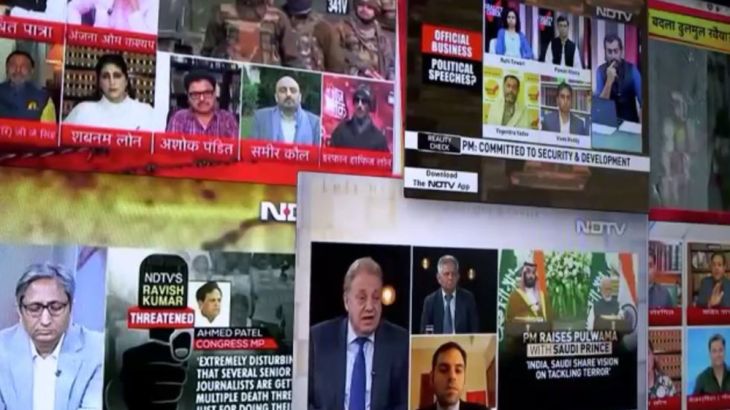
Narratives of rage and revenge in India
Talk of war on the Indian airwaves after a bombing in Kashmir. Plus, journalism and justice in Northern Ireland.
On The Listening Post this week: Following a bombing in Kashmir, there is talk of war on the Indian airwaves and hate mongering on social media. Plus, journalism and justice in Northern Ireland.
Narratives of rage and revenge in India
Last week, a suicide bomber killed 40 Indian soldiers in Kashmir. Jaish-e-Mohammad (JeM), an armed group based in Pakistan, has claimed responsibility for what has been called the worst attack of its kind in decades.
Keep reading
list of 4 itemsNPR editor resigns after accusing US outlet of liberal bias
Lawmakers brawl as Georgian Parliament considers ‘foreign agent’ bill
Journalist loses foot after being badly wounded in Israeli attack in Gaza
With Prime Minister Narendra Modi‘s government in New Delhi accusing the Pakistani government of backing the group, many Indian news outlets, not content with simply pointing the finger at Islamabad, are now calling for a crackdown on so-called “anti-nationals” and “terrorist sympathisers” at home.
Meanwhile on social media, Twitter, Facebook and WhatsApp in India have been abuzz with hate speech and incitement. With a general election just months away, the bombing of Kashmir and the way it has being covered could well affect the outcome in what is the biggest electoral exercise on the planet.
Contributors
Shakuntala Banaji – Department of Media and Communications, LSE
Rohit Chopra – Associate professor, Santa Clara University
Sanjay Kak – Documentary filmmaker
Kunal Purohit – Journalist
On our radar
Richard Gizbert speaks to producer Meenakshi Ravi about Facebook’s suspension of Kremlin-funded media outlets; and the appointment of CNN’s latest political editor, a former Trump administration official.
Documenting the Troubles: Journalism and justice in Northern Ireland
The challenges for journalists covering conflict zones are well-documented, but digging for difficult truths in post-conflict situations can also be a contentious pursuit. Northern Ireland, and a period known as the Troubles – 30 years of sectarian violence that ended with the Good Friday Agreement of 1998 – is a case in point.
During the conflict itself, journalists in Britain and Ireland faced varying degrees of censorship – especially those working in television.
Although the fighting ended long ago, just last year two documentary makers were arrested over a film they made alleging that the British government was complicit in a 1994 massacre that remains – like so many cases from that era – unsolved.
Daniel Turi reports on the ongoing difficulties of documenting the Troubles in Northern Ireland.
Contributors
Ed Moloney – Author, A Secret History of the IRA
Susan McKay – Contributor, The Irish Times
John Ware – Former reporter, BBC Panorama
Ben Lowry – Deputy editor, The News Letter
Trevor Birney – Producer, No Stone Unturned
Barry McCaffrey – Investigative reporter, No Stone Unturned